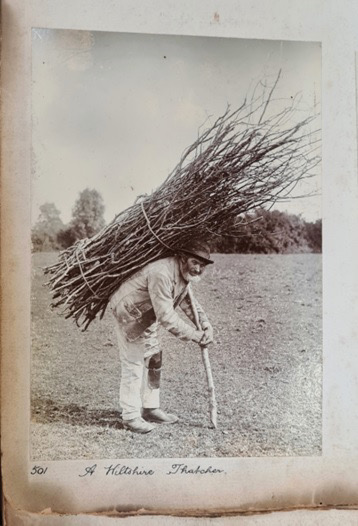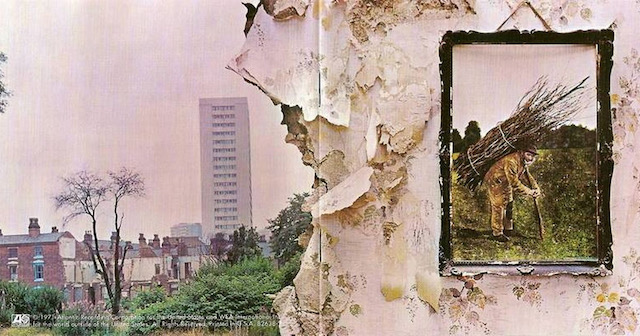
A man depicted on the album cover of Led Zeppelin IV has been revealed as a 19th Century thatcher, reports BBC. The figure is most likely Lot Long from Mere in Wiltshire, photographed by Ernest Farmer.
Brian Edwards, from the University of the West of England (UWE), found the original picture when looking through a photograph album for other research. "I instantly recognized the man with the sticks - he's often called the stick man," he said.
A long-time fan of British rock band Led Zeppelin, he told BBC Radio Wiltshire "it was quite a revelation".
Wiltshire Museum has since acquired the photograph and plans to include it in an exhibition next year. Released in 1971, Led Zeppelin IV has sold more than 37 million copies worldwide and includes the huge hit "Stairway To Heaven".
The cover art had previously been described as a photograph of a painting, which was reportedly discovered by the band's lead singer, Robert Plant, in an antique shop near guitarist Jimmy Page's house in Berkshire.
But the framed image which can be seen on the cover is actually a colourized photograph, the whereabouts of which is now unknown.

The following from Wiltshire Museum:
The Wiltshire Thatcher – A Photographic Journey Through Victorian Wessex (6th April 2024 - 15th September 2024)
This exhibition celebrates the work of Ernest Farmer, who today is little-known but was a leading figure in the development of photography as an art form. Through the exhibition, we will show how Farmer captured the spirit of people, villages and landscapes of Wiltshire and Dorset that were so much of a contrast to his life in London. It is fascinating to see how this theme of rural and urban contrasts was developed by Led Zeppelin and became the focus for this iconic album cover 70 years later.
A framed colour version of this image of an elderly man carrying a large bundle of sticks on his back will be recognized worldwide. It is the centrepiece of the iconic front cover of Led Zeppelin IV which famously features no words.
The origin of the central figure has remained a mystery for over half a century. It can now be revealed as a late Victorian coloured photograph of a Wiltshire thatcher. A grey beard underlining his weathered face, the figure stoops whilst apparently pausing for the photographer, his leathery hands grasp the pole supporting the bundle of hazel on his back.
The original of the photograph made famous by the band was recently discovered in a late Victorian photograph album. The discovery was made by Brian Edwards, a Visiting Research Fellow with the Regional History Centre at the University of the West of England, and is in the Museum collections.
Released on November 8, 1971, Led Zeppelin IV has sold more than 37 million copies worldwide. The album’s cover artwork was radically absent of any indication of the musicians or a title. The framed image, often been referred to as a painting, is understood to have been discovered by the band’s lead singer Robert Plant in an antique shop near guitarist Jimmy Page’s house in Pangbourne, Berkshire. Closer inspection reveals this framed image was a coloured photograph, the whereabouts of which is now unknown.
The black and white original Victorian photograph was discovered during ongoing research extending from the Ways of Seeing Wiltshire exhibition (20 May 2021 to 30 August 2021), which was curated by Brian Edwards in partnership with Wiltshire Museum. From paintings to photographs and artefacts to memories, Edwards’ research involved monitoring everyday sources that stimulates public engagement with Wiltshire’s past. While following up on some early photographs of Stonehenge, Edwards came across the Victorian photograph Led Zeppelin made familiar over half a century ago.
Featuring exceptional photographs from Wiltshire, Dorset and Somerset, the Victorian photograph album contained over 100 architectural views and street scenes together with a few portraits of rural workers. Most of the photographs are titled and beneath the photograph made famous by Led Zeppelin the photographer has written ‘A Wiltshire Thatcher’. The Victorian photograph album is titled ‘Reminiscences of a visit to Shaftesbury. Whitsuntide 1892. A present to Auntie from Ernest.’
Brian Edwards said: “Led Zeppelin created the soundtrack that has accompanied me since my teenage years, so I really hope the discovery of this Victorian photograph pleases and entertains Robert, Jimmy, and John Paul.”
A part signature matching the writing in the album suggests the photographer is Ernest Howard Farmer (1856-1944), the first head of the School of Photography at the then newly renamed Polytechnic Regent Street. Now part of the University of Westminster, Farmer had worked in the same building as the instructor of photography since 1882, when it was then known as the Polytechnic Young Men’s Christian Institute.
Further research suggests the thatcher captured in the image is Lot Long (sometimes Longyear), who was born in Mere in 1823 and died in 1893. At the time the photograph was taken, Lot was a widower living in a small cottage in Shaftesbury Road, Mere.

(Photo - Wiltshire Museum, Devizes)